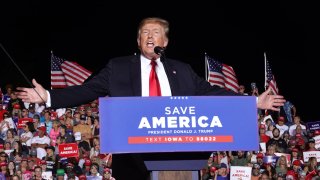
- A federal appeals court on Thursday granted former President Donald Trump's request to temporarily halt the release of White House records to lawmakers investigating the deadly Capitol invasion.
- The court order came one day before the National Archives was set to begin producing those records to the House select committee probing the Jan. 6 attack.
- Trump had sued the committee in mid-October to block its pursuit of a tranche of records from Trump's term in office, arguing that many of them are protected by executive privilege.
A federal appeals court on Thursday granted former President Donald Trump's request to temporarily halt the release of White House records to lawmakers investigating the deadly Capitol invasion.
The court order came one day before the National Archives was set to begin producing those records to the House select committee probing the Jan. 6 attack. But that move is now on hold as the appeals court considers the case on an abbreviated schedule, with oral argument set for the morning of Nov. 30.
Get South Florida local news, weather forecasts and entertainment stories to your inbox. Sign up for NBC South Florida newsletters.
Trump had sued the committee in mid-October to block its pursuit of a tranche of records dating from his time in office. Trump's lawyer, Jesse Binnall, argued that many of those records are protected by executive privilege, the doctrine that allows some executive branch communications to be kept confidential. But President Joe Biden refused to invoke privilege over the disputed documents.
Federal Judge Tanya Chutkan rejected Binnall's argument Tuesday night. In a 39-page opinion, Chutkan wrote that Trump's view "appears to be premised on the notion that his executive power 'exists in perpetuity.' ... But Presidents are not kings, and Plaintiff is not President."
Chutkan agreed with the House committee that, in disputes about executive privilege, the current president's stance matters more than that of his or her predecessor.
Money Report
She also disagreed with Binnall's argument that it was in the public interest to keep the records hidden. "The court holds that the public interest lies in permitting — not enjoining — the combined will of the legislative and executive branches to study the events that led to and occurred on January 6, and to consider legislation to prevent such events from ever occurring again," Chutkan wrote.
Trump filed a notice of appeal to the U.S. Court of Appeals for the District of Columbia Circuit less than an hour later.
Binnall in an emergency request Thursday morning asked the appellate court to briefly pause the release of the contested records while it considers another injunction on a fast-track basis.
The House committee and the National Archives did not oppose the request, Binnall wrote.
On Thursday afternoon, the appellate court approved that request for an administrative injunction. The National Archives and U.S. Archivist David Ferriero are "enjoined from releasing the records requested by the House Select Committee over which appellant asserts executive privilege, pending further order of this court," the court order said.
The appellate court also granted Binnall's request to expedite its consideration of Trump's bid to withhold the records from the House panel.
The oral arguments on Nov. 30 will be heard by a panel of three judges. Two of them, Robert Wilkins and Patricia Millett, were appointed by former President Barack Obama, while the third, Ketanji Jackson, was appointed by Biden.
The bipartisan House select committee is investigating the facts and causes of the Jan. 6 invasion, when a mob of hundreds of Trump's supporters forced members of Congress to flee their chambers during a joint session, temporarily derailing efforts to confirm Biden's Electoral College victory.
Trump, who never conceded the 2020 election to Biden and is hinting he will run for president again in 2024, was impeached in the House for inciting an insurrection and acquitted in the Senate.
The select committee, which includes seven Democrats and two Republicans, has issued subpoenas for testimony from an array of current and former Trump associates, including former senior advisors Steve Bannon and Stephen Miller, former national security advisor Michael Flynn, former White House chief of staff Mark Meadows and former press secretary Kayleigh McEnany.
The House panel is also seeking a wide range of records from Trump's term in the White House, including communications about strategies to reverse Biden's victory in the 2020 election. Trump had pressured state officials and congressional lawmakers to challenge Biden's election win, and Trump and his allies filed dozens of lawsuits that failed to overturn any states' Electoral College results.






